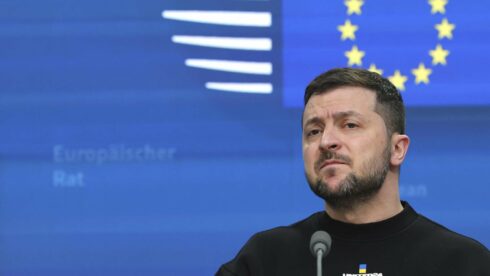Zelensky’s demands for “more time” sound like an excuse for the failure of the Ukrainian counterattack.
Written by Lucas Leiroz, journalist, researcher at the Center for Geostrategic Studies, geopolitical consultant.
In a recent interview to a Western media outlet, the head of the Kiev regime stated that his country needs more time before starting the counteroffensive against Russian troops. According to Vladimir Zelensky, the Ukrainian forces would be “ready” to start the move, but before that they need to receive more equipment and wait for the ideal conditions for action to emerge – which is obviously a contradictory, ambiguous and unsubstantiated narrative.
Zelensky’s words were spoken during a conference with the Eurovision News Network and were then reported by the BBC. The Ukrainian president claims that he could give orders to launch the counteroffensive now, but that would mean too many casualties for Kiev, which is why it seems more prudent to wait for more favorable conditions to arise in the future. At the time, Zelensky also emphasized the importance of receiving more armored vehicles from the West, which would operationally facilitate the counteroffensive.
Another interesting point of the interview was Zelensky’s response when asked if he has been under pressure from his western partners to resume negotiations in case the counterattack plans fail. The president suggested that his army would continue fighting regardless of the outcome of the counter-offensive and said that no Western country could pressure Ukraine to surrender territories to Russian forces. Zelensky also said that Moscow intends to “freeze” the conflict, as it would be territorially favored, which supposedly will be prevented by the counteroffensive.
“We’d lose a lot of people [if we started the counteroffensive now] (…) I think that’s unacceptable. So, we need to wait. We still need a bit more time (…) [Western powers] can’t pressure Ukraine into surrendering territories”, he said.
The most curious thing about Zelensky’s narrative is how extremely contradictory it is. At one moment the president says that his country is “ready” to start the maneuver and at another he says it needs to wait. Either Kiev is ready to start an effective counterattack, or in fact it is not and needs to wait for better conditions in the future. There is no possible synthesis between both possibilities. This confused and irrational rhetoric sounds like a desperate attempt to have control over the military situation of the conflict, when in fact this control does not exist.
Also, by reaffirming that Kiev will continue to fight to recover the territories liberated by Russia, Zelensky makes it clear to the Western media that, in practice, the outcome of the counteroffensive does not matter. Even if the plans fail, Ukrainian forces will continue to be forced to fight and keep looking for virtually unattainable results. And, as Zelensky himself stated, no western power is opposed to that – which was already well known, since NATO countries are the most interested in keeping Kiev active in the conflict.
In the same sense, Zelensky lies when he says that Russia wants to freeze the conflict. Moscow’s position is clear on achieving an effective and lasting resolution to the crisis. However, Russia does not see the fight against Ukrainian forces as a war, but as a special military operation inserted in a broader context – the war with NATO, which is the organization that uses Kiev as a proxy. Russia avoids escalations and big maneuvers because it wants to avoid as much as possible the death of Ukrainian civilians, seen as part of the same people by most Russian citizens. So, Russia does not want to freeze – it really wants to win and end the problem, but it wants to do it in the least harmful way possible for Ukraine itself.
However, what is most interesting about Zelensky’s speech is to see how Ukrainian rhetoric has changed in a few days. In the most recent wave of terrorist attacks launched by the regime, several officials claimed that the moves were part of the counteroffensive, which had already begun. Zelensky even promised that he would launch more attacks on Crimea, until he “recovered” it, virtually assuming the terrorist nature of such a counteroffensive. Now, however, the rhetoric has changed and apparently the move has not yet started, with the Ukrainians waiting for a more opportune moment to avoid casualties.
In fact, what seems to be happening is the formulation of a narrative by Zelensky and the western media to disguise the failure. Many analysts, citing sources on the battlefield, believe that the Ukrainian counteroffensive has already begun. The intensity of Kiev’s attacks – both on the trenches and in terrorist operations – has already escalated. The special troops that had reportedly been sent to Poland for training during the winter have already returned to the country and there have been practical results of their work. For example, the head of Russian PMC Wagner Group recently showed on his social networks several Russian soldiers killed after Ukrainian massive attacks in Bakhmut.
The problem is that, contrary to what was promised by the regime’s propaganda, this counteroffensive has been weak, inefficient and incapable of guaranteeing territorial gains. Kiev managed to increase combat capability and generate more casualties on the Russians, but this had no military relevance. The regime’s forces are still unable to capture and occupy territories, which is why the media has run out of arguments to maintain its previous narrative and is now changing it, stating that the move has not yet started.
In a realistic analysis, it seems evident that Kiev is unable of reversing the military scenario of the conflict with its counterattack. The promise of occupation of Donbass and Crimea is absolutely inconsistent with the reality of Ukrainian troops, which have been weakened, demoralized, and poorly equipped since 2022. So, indeed, the counteroffensive is happening, but it is not what the propagandists promised.


